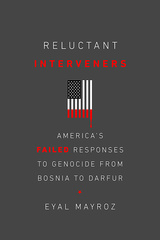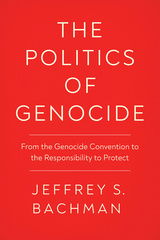The United States and the Armenian Genocide
History, Memory, Politics
This is the first book to examine how and why the United States refused to acknowledge the Armenian Genocide until the early 2020s. Although the American government expressed sympathy towards the plight of the Armenians in the 1910s and 1920s, historian Julien Zarifian explores how, from the 1960s, a set of geopolitical and institutional factors soon led the United States to adopt a policy of genocide non-recognition which it would cling to for over fifty years, through Republican and Democratic administrations alike. He describes the forces on each side of this issue: activists from the US Armenian diaspora and their allies, challenging Cold War statesmen worried about alienating NATO ally Turkey and dealing with a widespread American reluctance to directly confront the horrors of the past. Drawing from congressional records, rare newspapers, and interviews with lobbyists and decision-makers, he reveals how genocide recognition became such a complex, politically sensitive issue.
Julien Zarifian's study sheds light on much more than the question of the Armenian Genocide: it sheds light on an American political class and a federal administration that have long been susceptible to outside pressure from pro-Turkish lobbies, revealing a political culture that is relatively untouched by ethical questions. The author's methodical dismantling of this process is an essential tool for understanding the inner workings of the American state.
Julien Zarifian has produced a masterful account of the domestic and international ‘politicking’ that led to the decades-long delay in America’s recognizing as genocide the mass killings of Armenians by the Ottoman Empire, perpetrated during the era of the First World War. His skillful assessment of the cross-cutting pressures that were brought to bear upon Washington decisionmakers from both foreign and domestic sources establishes The United States and the Armenian Genocide as the definitive work on the topic.
In this exceptional book, Julien Zarifian has given us the first thorough account of the process that led from a reluctance to antagonize the denialist Turkish government to the extraordinary decision of the Biden administration to acknowledge the tragedy that befell Armenians as genocide. As a study of diplomacy and public activity, this work elevates our understanding of how governments and ordinary people complexly intersect in the making of foreign policy.
Introduction
Part I. The United States, the Armenians, and the Armenian Genocide before the Genocide Convention
1. The United States and the Armenians Prior to the Genocide: The Emergence of Certain Bonds
2. The United States and the Massacres of 1915
3. From Hope to “Memory Erosion:” The United States and the Armenian Matter in the Interwar Period
Part II. The United States and the Post-WWII Armenian Awakenings
4. The United States and the Armenian Awakening of the Late 1940s
5. The United States and the Armenian Awakening of 1965
6. The United States and Turkish-Armenian Extreme Polarization in the 1970s-1980s
Part III. The First Steps of a Decades-Long Struggle for Recognition of the Armenian Genocide by the U.S. Government (1970s/1980s)
7. A Sinuous Road: The Matter of Recognition of the Armenian Genocide in the United Nations, at the White House, and in Congress in the 1970s
8. Progress and Setbacks During the Reagan Administration
9. A Case Both Emblematic and Unique: Bob Dole and Senate Joint Resolution 212 (1989-1990)
Part IV. Intensification and Diversification of the Opposition Between the Pro- and the Anti-Recognition Factions (1990s/2000s)
10. The Armenian Genocide and the U.S. Post-Cold War Context
11. George W. Bush’s First Mandate: Between Turkish-Armenian Reconciliation Illusions and Armenian Efforts in Congress
12. George W. Bush’s Second Mandate and the Difficult Progress of U.S. Recognition of the Genocide
Part V. Toward Full Recognition of the Genocide: The Obama, Trump, and (Early) Biden Eras
13. High Hopes and Immense Regrets: The Genocide (Non) Recognition during the Obama Era
14. Toward Full Recognition of the Genocide in Congress—Despite the Trump Administration’s Opposition
15. “Finishing the Job”: President Biden’s Historic Recognition of the Genocide
Part VI. Why It Took the United States Fifty Years to Recognize the Armenian Genocide
16. Turkey, Geopolitics and Nonrecognition of the Armenian Genocide by the United States
17. The Nonrecognition of the Armenian Genocide: A Matter of Lobbying?
18. The Armenian Genocide and Memory Issues in the United States
Conclusion
Notes
Bibliography
Index













